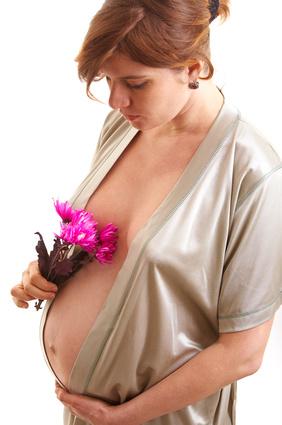Early menopause strikes 1 out of every 100 women who are between 30 and 39 years old and 1 in every 1,000 between 15 and 29, according to the American Pregnancy Association. When it happens to you, it can be frightening, especially if you have not yet completed your family. Pregnancy and early menopause have similar symptoms. While early menopause can be quite a shock in your life, if acted upon quickly, you may still be able to add a child to your family.
Features
Early menopause occurs when your ovaries stop functioning normally. Your ovaries are designed to drop an egg each month into your uterus, and if that egg becomes fertilized by sperm, you become pregnant. In early menopause, your ovaries cease dropping the eggs, which effectively renders you unable to conceive. Symptoms of early menopause include irregular menstrual periods. Your cycle may become shorter or longer, and your flow may become heavier or lighter, depending on your particular body. In addition, hot flashes, a reduced interest in sex and night sweats are all indicators that you may be entering early menopause.
Similarities
Pregnancy and menopause have several symptoms in common. A cessation in periods is something that happens in both conditions. In menopause, periods can become lighter and resemble spotting. It is also not uncommon to experience some light bleeding during the implantation period of pregnancy as well as the first few months of gestation. Experiencing a heightened emotional sense is also common as you enter both early menopause and pregnancy.
Considerations
It is important to recognize the signs and symptoms of early menopause so that if it begins, you can take steps to conceive if your desire is to become pregnant. According to the American Pregnancy Association, going into premature menopause does not always mean an immediate, complete ovarian failure. It can also be caused by a dysfunction of the ovarian system that triggers an increasing depletion of eggs. When this occurs, you can still have periods, although they may be irregular or light compared to what they have been in the past.
Diagnosis
If you suspect that your symptoms are being caused by early menopause, you should make an appointment with your doctor. He will take a history of your symptoms and order a Follicle Stimulating Hormone test which tests the level of hormones in your system. A low level of FHS indicates possible early menopause.
Options
Even if you have entered or are entering early menopause, there is still hope for you to have a baby. The options include the use of medically supervised fertility drugs or donor eggs. Donor eggs are eggs that are provided by a third-party female, impregnated by your significant other’s sperm and them implanted into your uterus.
With fertility drugs, you are given high hormone doses so that your ovaries might be kick started into dropping a few more eggs that can be fertilized. The risk of fertility treatments are multiple births. Both donor programs and fertility drug programs can be cost prohibitive. As of 2010, the average one-month fertility program was $1,500 to $3,000.
Photo Credit
- pregnancy image by AGphotographer from Fotolia.com





